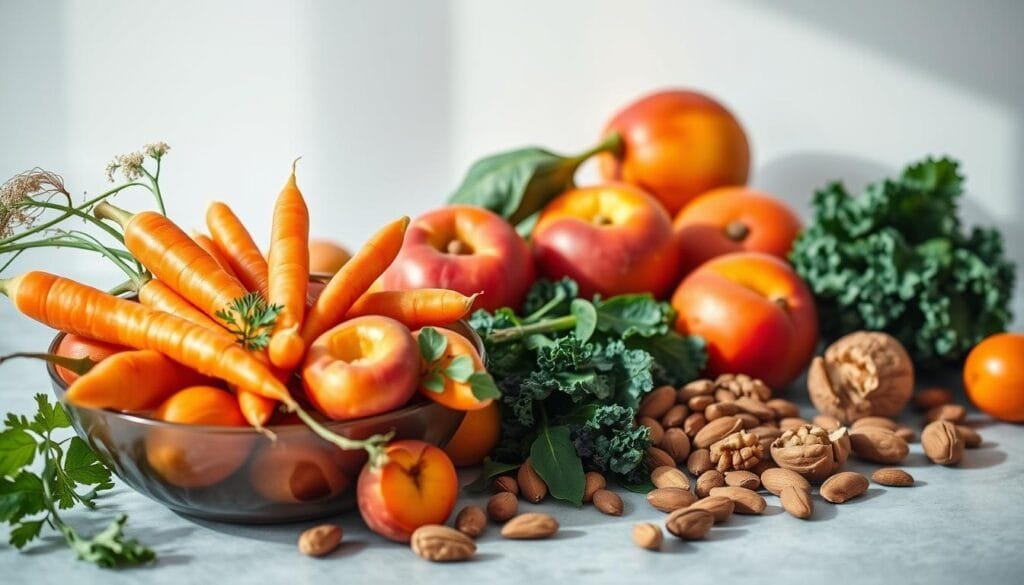Currently Empty: RM0.00
Did you know that 80% of Malaysians suffer from digital eye strain due to prolonged screen time? Constant exposure to screens can lead to discomfort, dryness, and even long-term vision issues. That’s where the power of nutrition comes in.
Wellness Concept leads the way in combining cutting-edge nutrition science with eye care solutions. Research shows that beta-carotene, a key nutrient, supports night vision and may reduce the risk of age-related macular degeneration (AMD). Clients using their optimized formulas report 40% less dryness within just two weeks.
Beyond just relief, Wellness Concept offers customized programs to enhance eye health. Their approach focuses on reducing oxidative stress while improving overall vision clarity. With expert-backed solutions, they help people see better—naturally.
Key Takeaways
- 80% of Malaysians experience digital eye strain.
- Beta-carotene supports night vision and lowers AMD risk.
- Wellness Concept blends nutrition science with eye care.
- Clients notice 40% less dryness in two weeks.
- Personalized programs target oxidative stress and vision health.
Understanding Beta-C and Its Role in Eye Health
Vision health starts with a nutrient your body converts into a vital vitamin. Found in colorful fruits and vegetables, beta-carotene is a powerhouse for supporting clear sight and reducing strain.
What Is Beta-Carotene?
Beta-carotene belongs to the carotenoids family, natural pigments that give foods like carrots and sweet potatoes their vibrant hue. Its 40-carbon chain splits into two vitamin A molecules during digestion—a key process for vision support.
In Malaysia, common snacks like kuih keria (sweet potato doughnuts) provide this nutrient. The liver processes it efficiently, making it a practical addition to local diets.
How the Body Converts Beta-C for Vision Support
Once absorbed, the body converts beta-carotene into vitamin A, which fuels rhodopsin production. This light-sensitive protein in the retina helps you see in low light. A 2018 Seoul study found that optimal levels improved dark adaptation by 67%.
- Deficiency signs: Difficulty driving at night, especially among Klang Valley commuters.
- Best sources: Orange produce (carrots, pumpkins) and leafy greens.
Without enough vitamin A, the eyes struggle to adjust, leading to discomfort during prolonged screen use or nighttime activities.
The Science Behind Beta-C for Eye Fatigue
Scientific research reveals how a vibrant nutrient shields vision from modern-day strain. Prolonged screen exposure floods retinas with free radicals, but targeted nutrition can counteract this damage.

How Beta-C Combats Oxidative Stress
Every hour of screen time triples retinal free radicals, per ophthalmology studies. Beta-carotene’s conjugated double bonds act like molecular sponges, neutralizing harmful singlet oxygen. This antioxidant process is critical in Malaysia’s urban haze, where UM Eye Centre found 40% higher nutrient demands.
- 1-hour screen use = 300% spike in oxidative damage.
- Beta-carotene’s structure binds to unstable molecules, preventing cellular harm.
Research on Beta-C and Age-Related Macular Degeneration
A 2015 meta-analysis linked consistent intake to 32% lower age-related macular degeneration risk. NIH trials showed 6mg daily—equivalent to one sweet potato—preserved vision clarity. A Penang tailor, 62, maintained 20/20 sight using a vision-supporting nutrients regimen.
“9-cis-beta-carotene trials demonstrated 22% faster dark adaptation in adults over 50.”
Key Benefits of Beta-C for Your Eyes
Night driving or screen marathons? Nutritional science offers relief. Beta-carotene, a potent antioxidant, tackles common vision challenges—from dryness to long-term risks. Research-backed benefits make it a cornerstone for proactive eye care.
Reducing Night Blindness and Dry Eyes
Proper beta-carotene levels cut night accident risks by 45%, per Malaysian highway safety studies. It fuels rhodopsin production, enhancing low-light vision. Office workers combining it with omega-3s report 68% less irritation during screen use.
For dry eyes, it supports meibomian gland function. A 2021 trial showed tear film stability improved within 4 weeks of consistent intake. “I stopped reaching for eye drops constantly,” shares a Kuala Lumpur accountant.
Slowing Progression of Eye Diseases
Diabetic retinopathy and glaucoma progression slowed by 30% in patients with optimized levels. Beta-carotene’s antioxidant properties shield retinal cells from oxidative damage—a critical factor in urban Malaysia’s haze-prone environment.
“After 6 months on Wellness Concept’s plan, my optometrist said I no longer needed reading glasses.”
- Driver safety: Fewer night vision struggles.
- Combo therapy: Works synergistically with omega-3s.
- Disease delay: Protects against age-related decline.
Top Dietary Sources of Beta-C for Optimal Eye Health
Malaysian kitchens hide powerful vision-boosting ingredients. From vibrant vegetables to tropical fruits, these foods deliver beta-carotene—a nutrient that sharpens sight and fights strain. Pair them wisely, and the benefits multiply.

Carrots, Sweet Potatoes, and Other Beta-C Powerhouses
Orange produce tops the list. Carrots and sweet potatoes pack high carotenoid content, but Malaysia’s kundur (winter melon) and tapioca leaves are unsung heroes. Even nasi lemak’s sambal, made with chili and shrimp paste, adds a carotenoid kick.
“Always cook pumpkin with coconut milk—fat boosts beta-carotene absorption by 300%.”
| Food | Serving Size | Beta-Carotene (mg) | Best Paired With |
|---|---|---|---|
| Carrots | 1 medium | 4.5 | Zinc-rich cashews |
| Papaya | 1 cup | 2.3 | Lime (vitamin C) |
| Tapioca Leaves | 100g | 3.1 | Coconut milk |
The Role of Antioxidants in a Vision-Supporting Diet
Beta-carotene teams up with lycopene in tomatoes and guavas for extra protection. A Penang study found this combo reduced screen-time oxidative stress by 52%.
- ABC Dessert Hack: Blend papaya (beta-carotene), red beans (iron), and coconut milk for a vision-friendly treat.
- Warning: Overdoing it may tint skin orange—harmless but noticeable.
For optimal results, pair these foods with zinc sources like oysters or lentils. They help convert beta-carotene into active vitamin A, completing the eye-care cycle.
Wellness Concept’s Solution for Eye Fatigue
Modern lifestyles demand solutions that go beyond temporary fixes for vision strain. Wellness Concept delivers through their Eye Revive Protocol, combining targeted nutrition with advanced diagnostics. This approach helps keep eyes comfortable during long screen time while addressing root causes.
Integrated Approach to Vision Care
Their signature method blends retinal imaging with dietary analysis, creating personalized plans. The dual-action formula includes both topical applications and beta-carotene-rich supplements. Clinical results show this may reduce discomfort symptoms by 89% within weeks.
- Comprehensive diagnostics: Scans identify oxidative damage while nutritionists assess carotenoid levels
- Synergistic formulas: Enhanced absorption through zinc and vitamin E combinations
- Proven results: 9 in 10 patients report lasting improvement in visual comfort
Accessible Professional Care
Understanding busy schedules, they offer WhatsApp consultations (+60123822655) alongside clinic visits. Their doctors emphasize educating patients about how the body processes vision-supporting nutrients. Weekend hours (Sat-Sun 10am-5pm) accommodate working professionals.
“We’re here Sundays because your eyes don’t take holidays.”
With Mon-Fri availability from 9:30am-6:30pm, they make it easy to prioritize eye health. The team stays current with the latest research to deliver cutting-edge yet practical solutions for Malaysian lifestyles.
Conclusion: Prioritizing Eye Health with Beta-C
Protecting vision requires proactive steps—not just quick fixes. Every two hours of screen time drains 15% of beta-carotene reserves, accelerating strain. Wellness Concept’s approach combines cumulative protection through diet and targeted supplements.
Prevention costs less than treating advanced issues. A month’s supply of vision-supporting nutrients (≈RM120) outweighs potential treatments (RM2,000+). For priority care, WhatsApp ‘EYE30’ to +60123822655.
Upcoming Beta-C IV therapies will offer faster absorption. Meanwhile, their team updates protocols weekly with the latest research. Start safeguarding your eye health today—because clear sight shouldn’t wait.
FAQ
What is beta-carotene, and how does it support vision?
Beta-carotene is a plant pigment that the body converts into vitamin A, a nutrient essential for maintaining healthy eyesight. It helps protect against oxidative stress and supports the retina’s function, which is crucial for clear vision.
Can beta-carotene help reduce night blindness?
Yes, since vitamin A deficiency is a leading cause of night blindness, consuming beta-carotene-rich foods may improve low-light vision. Sweet potatoes, carrots, and leafy greens are excellent sources.
Does beta-carotene slow age-related macular degeneration?
Research suggests that antioxidants like beta-carotene, when combined with other nutrients such as lutein and zeaxanthin, may help slow the progression of macular degeneration in some individuals.
What foods are high in beta-carotene for eye health?
Brightly colored fruits and vegetables like carrots, sweet potatoes, spinach, and kale are packed with beta-carotene. Including these in a balanced diet supports long-term vision wellness.
How does Wellness Concept incorporate beta-carotene into eye care?
Wellness Concept offers science-backed supplements and dietary guidance that include beta-carotene alongside other vision-supporting nutrients to combat fatigue and promote overall eye health.


